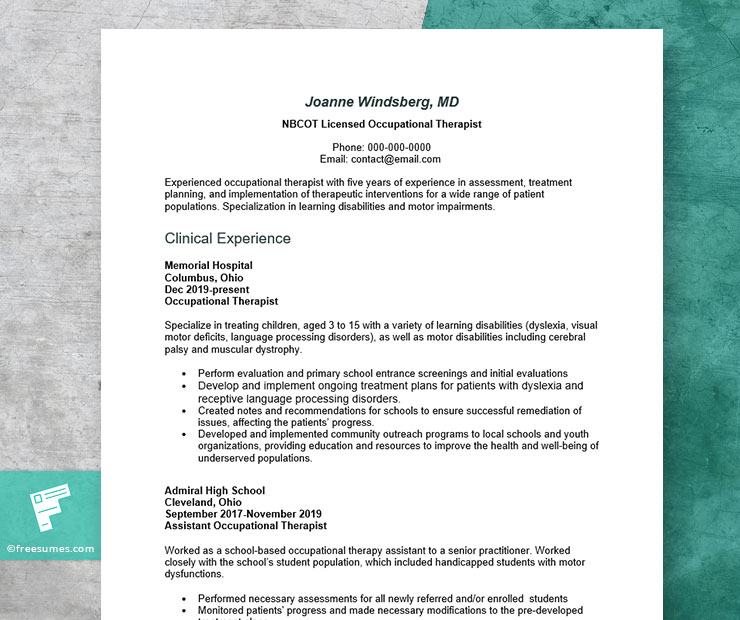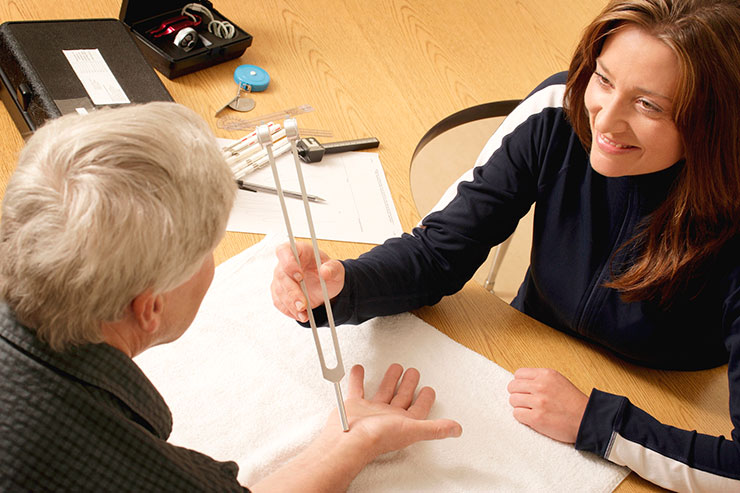Occupational therapy is a holistic approach to health care that utilizes everyday activities to improve a person’s physical, mental, and emotional well-being. It’s a rewarding medical field, where you get to work with patients of all ages, genders, and disabilities, helping them regain their independence and participate in activities they enjoy. The job can also be very satisfying, as you get to witness the positive impact you have made on an individual’s life.
If the above description resonates with you, you’re an amazing OT specialist, deserving an equally great job. Now how do you land one? Use our sample occupational therapy resume as a writing prompt — and then apply several more customization tips.
Occupational Therapy Resume Example (Word)

Occupational Therapist Resume (plain text)
Joanne Windsberg, MD
NBCOT Licensed Occupational Therapist
Experienced occupational therapist with five years of experience in assessment, treatment planning, and implementation of therapeutic interventions for a wide range of patient populations. Specialization in learning disabilities and motor impairments.
Clinical Experience
Memorial Hospital
Columbus, Ohio
Dec 2019-present
Occupational Therapist
Specialize in treating children, aged 3 to 15 with a variety of learning disabilities (dyslexia, visual motor deficits, language processing disorders), as well as motor disabilities including cerebral palsy and muscular dystrophy.
- Perform evaluation and primary school entrance screenings and initial evaluations
- Develop and implement ongoing treatment plans for patients with dyslexia and receptive language processing disorders.
- Created notes and recommendations for schools to ensure successful remediation of issues, affecting the patients’ progress.
- Developed and implemented community outreach programs to local schools and youth organizations, providing education and resources to improve the health and well-being of underserved populations.
Admiral High School
Cleveland, Ohio
September 2017-November 2019
Assistant Occupational Therapist
Worked as a school-based occupational therapy assistant to a senior practitioner. Worked closely with the school’s student population, which included handicapped students with motor dysfunctions.
- Performed necessary assessments for all newly referred and/or enrolled students
- Monitored patients’ progress and made necessary modifications to the pre-developed treatment plans.
- Collaborated with the faculty staff to ensure proper implementation of all treatment strategies; maintained active communication with parents.
- Developed and implemented a new program for students with learning disorders, resulting in improved graduation outcomes.
Palmira Testing Lab
Cleveland, Ohio
June 2016-August 2017
Part-time Phlebotomist
Worked as a part-time phlebotomist at a lab, performing a variety of tests for the local hospitals.
- Obtain blood samples for prescribed testing and through venipuncture or capillary puncture.
- Ensured proper blood specimen storage/transportation, according to the safety protocols
- Performed blood drawing procedures at lab-run mobile blood-bank units.
Education
Ohio State University
Master of Occupational Therapy
September 2015 – May 2018
3.6 GPA
Coursework and fieldwork focusing on: Cerebral palsy treatment strategies, dyslexia management plans, effective patient & family relations.
Certification and License
- National Board of Certification of Occupational Therapy (NBCOT), 2019
- Occupational Therapy License, Ohio, 2022
How to Write a Stellar Occupational Therapy Resume
Occupational therapy is a rewarding and lucrative career. OTs earn a median salary of $95,047 annually with senior staffers, earning north of six figures.
However, the competition can be tough for great occupational therapy jobs. Therefore, your resume needs to be coherent, compelling, and straight to the point.
To craft the best occupational therapy resume for yourself, apply the following tips.
Follow a Standard Resume Format
Medical resumes need to be short and on-point. Open up with a compelling resume summary, listing your key skills, experiences, and patient outcomes.
Next, style a clinical experience (work experience) section in reverse-chronological order, where you list your past employment details. For each, include three to four resume bullet points, summarizing your duties and achievements.
Round up your resume with an Education section, listing your degree, certifications, training, and licenses.
Read more about organizing different sections of your resume.
Emphasize your Experience With Particular Populations
Occupational therapists get to work with diverse patient groups, ranging from veterans and the elderly to the youngest children. Many professionals often choose their “niche” early on and have particular clinical interests (and experiences) with specific population groups. If that’s the case, be forthcoming about your core competencies.
The above occupational therapist resume example emphasized the candidate’s experience with younger children, as well as specific impairments (dyslexia, learning, and motor disorders). State your areas of excellence to better showcase that you can reach great outcomes for such patients.
That said, you should also indicate that you are comfortable with working with diverse populations and people of different demographics and cultural backgrounds.
Showcase Your Interpersonal Skills
OTs often have to collaborate with other healthcare professionals, as well as the patients’ family members, employers, or educational establishments. Emphasize your interpersonal skills — active listening, negotiation, empathy, conflict management, teamwork, etc. The best way to do so is by putting these skills into the context of specific duties or accomplishments.
For example, you can briefly mention outreach or educational programs you’ve created, talk about the support you’ve provided to family members, or specific outcomes you’ve achieved together with others.
Final Tip: Try a “Core Competencies” Section
If you are an entry-level candidate or transitioned to occupational therapy from another niche, having a “Core Competencies” section between your resume summary and work experience can be a good idea.
This way you can showcase your transferable skills, as well as recently completed specialized training before a prospective employer starts wondering why your past work experience doesn’t quite match the job description.






